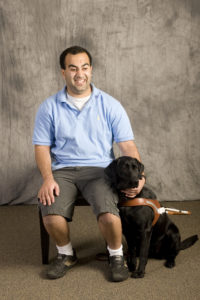It’s difficult enough for students to come to CSU from an Arabic-speaking country, having to get used to a new language and culture.
Let alone if they’re blind — and they choose a highly visual subject like computer programming.
Noah Al Hadidi did just that, earning his undergraduate degree in computer science from CSU in 2015. But that wasn’t enough: This week he’ll collect a master’s degree in computer information systems.
 Al Hadidi, who is from Oman, has been blind since he was seven months old. After being educated in Bahrain, he attended high school in Saudi Arabia and worked for a company that distributed assistive technology tools. His manager, who had gone to school in Colorado, encouraged Al Hadidi to pursue a U.S. college education in computer science.
Al Hadidi, who is from Oman, has been blind since he was seven months old. After being educated in Bahrain, he attended high school in Saudi Arabia and worked for a company that distributed assistive technology tools. His manager, who had gone to school in Colorado, encouraged Al Hadidi to pursue a U.S. college education in computer science.
“So I said, ‘OK, I’ll do it,’” he recalls.
Choosing CSU
Al Hadidi was lucky enough to gain a scholarship for tuition and fees from the Ministry of Higher Education in Oman, and an anonymous donor agreed to pay for his housing and living expenses. He chose to attend CSU on his student visa because of its many resources for students with disabilities. And he’s glad he did: His computer science instructors used objects to demonstrate physically, through touch, concepts like the “tree” data structure.
“We got creative with things, using pipe cleaners, clay and magnets,” Al Hadidi says. “In my undergraduate education, they did the impossible. It’s remarkably amazing that I was able to graduate with a degree in computer science.”
He credits faculty who were willing to take the time to learn how to help him, as well as two CSU offices: Resources for Disabled Students and the Assistive Technology Resource Center.
Al Hadidi has several tools to aid him, including a screen reader (although he prefers using Braille in math classes because it lets him more easily move between lines and sections on a page, rather than listening to one line at a time). On the internet, in addition to the text on a web page, he relies on the “alternative text” that webmasters are supposed to enter with the images they post, to describe what is pictured.
“That’s what I’m depending on to get information,” Al Hadidi says. “If it’s not accurate, I’m losing a lot. Your description is my only way to see your website.”
Other tools
He has a smartphone app that can recognize denominations of money, and he’s tried using a special camera that can identify common objects like a box or a chair. It can even identify faces of people he knows, but Al Hadidi says the technology still needs additional development.
“It has to see an entire face to recognize it,” he says. “It doesn’t work at parties.”
When crossing intersections without an audible pedestrian signal to tell him when it’s safe, he uses the sound of cars: Whether at a stop sign or stoplight, he crosses when he hears the acceleration of an adjacent car that is traveling the same direction.
And he has a friend to help him get around. She’s an 8-year-old black Labrador retriever named “Amiga” who knows commands like left, right, forward, wait, stairs, elevator, escalator, trash can, chair, curb and light pole. “Hop up” means go faster, “do your business” means the obvious, and when Al Hadidi says “hug,” Amiga puts her front paws on his shoulders.
He prefers a service animal to a white cane.
“A cane is an obstacle finder,” he says. “A dog is an obstacle avoider.”
Getting around
Al Hadidi explains that he has a virtual map of campus in his mind, and uses sounds, smells and the texture of the ground surface to determine where he is. He points to a wall six feet away and says he knows it’s there because of the way sound waves bounce off it.
Al Hadidi hasn’t let his disability stand in the way of enjoying sports like rock climbing, skiing, running, hiking, rowing, ice climbing, water skiing, biking, ice skating and swimming. His favorite, though, is a game for the visually impaired called “goal ball.” Teams of three roll a ball with a bell in it back and forth across a volleyball court, and the objective is to get the ball past the opposing team.
“I love to be challenged,” he says. “If there’s anything that’s an adventure, I’ll do it.”
While his immediate challenge after graduation is to find a job to gain additional skills in developing and testing assistive technology, his ultimate adventure is to start a tech school in Oman for those with disabilities like his. Al Hadidi says most people in his home country believe blind people can’t do math and science.
“They think it’s all tied to vision,” he explains. “I want to show them they are wrong.”